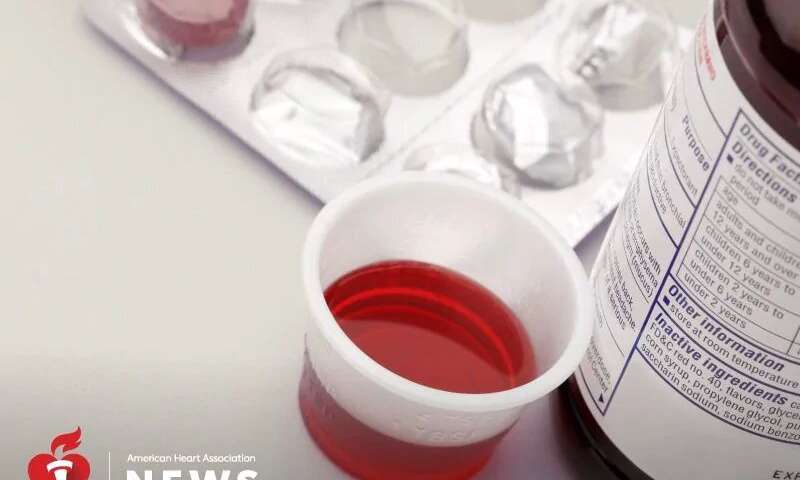
Flu has so far infected more than 6 million Americans this season, and winter colds are making their rounds. If you’ve been hit by either, you may be thinking about heading to your local pharmacy to relieve your aches, pains and congestion.
But before you do, you need to consider how some over-the-counter cold medicines may impact your heart.
“People with uncontrolled high blood pressure or heart disease should avoid taking oral decongestants,” said Sondra DePalma, a physician assistant at the PinnacleHealth CardioVascular Institute at UPMC Pinnacle in Pennsylvania. “And for the general population or someone with low cardiovascular risk, they should use them with the guidance of a health care provider.”
DePalma co-authored guidelines released in 2017 by the American Heart Association and American College of Cardiology focusing on the management of high blood pressure in adults. Both decongestants and non-steroidal anti-inflammatories (NSAIDs), found in many cold medicines, were listed as medications that could increase blood pressure.
Decongestants—like pseudoephedrine or phenylephrine—constrict blood vessels. They allow less fluid into your sinuses, “which dries you up,” said Dr. Erin Michos, associate director of preventive cardiology at the Johns Hopkins Ciccarone Center for the Prevention of Heart Disease in Baltimore.
“But if you have high blood pressure or heart disease, the last thing you need is constricting blood vessels,” she said. “It can exacerbate or worsen the condition.”
The biggest concerns are for people who have had a heart attack or stroke, or have heart failure or uncontrolled high blood pressure, Michos said.
But research on NSAIDs suggests seemingly healthy people might also be at risk.
A 2017 study in the Journal of Infectious Diseases looked at nearly 10,000 people with respiratory infections who were hospitalized for heart attacks. Participants were 72 years old on average at the time of their heart attacks and many had cardiovascular risk factors, such as diabetes and high blood pressure. Researchers found that people who used NSAIDs while sick were more than three times as likely to have a heart attack within a week compared with the same time period about a year earlier when participants were neither sick nor taking an NSAID.
This may be due to the compound effect.
Merely having a cold or the flu strains the cardiovascular system. Fighting the illness raises the heart rate and causes inflammation. Meanwhile, NSAIDs—which carry a warning label about the increased risk for a heart attack or stroke—can cause problems by reducing the amount of sodium excreted through the urine, which increases fluid retention and raises blood pressure, DePalma said.
NSAIDs can be especially risky for people with heart disease or heart failure, Michos added. People who are sick should use both classes of medications—decongestants and NSAIDs—judiciously and understand the potential side effects.
For decongestants, blood pressure guidelines suggest using them for the shortest duration possible or using an alternative such as nasal saline or antihistamines to help with congestion. Decongestants shouldn’t be taken longer than seven days before consulting with a health care provider, DePalma said.
NSAIDs taken as pills should be avoided when possible to avoid affecting blood pressure, guidelines advise. Rather, topical NSAIDs and acetaminophen are recommended alternatives.
“There are effective therapies that are less risky and definitely should be tried first,” DePalma said. “If other over-the-counter medications are needed, use them cautiously. And if someone finds they are having problems like high blood pressure or other things like heart palpitations, they should talk with their health care provider.”
If symptoms are mild or moderate, rest and drink plenty of fluids, Michos said. Preventing dehydration should help reduce body aches, clear mucous and may reduce the need for decongestants.
To help avoid getting sick in the first place, Michos recommends frequent hand-washing and lots of sleep, especially during cold and flu season. The Centers for Disease Control and Prevention recommends an annual flu vaccine for everyone 6 months and older, and the pneumonia vaccine for children under 2 and adults 65 and older.
Explore further
Copyright is owned or held by the American Heart Association, Inc., and all rights are reserved. Not all views expressed in this story reflect the official position of the American Heart Association. If you have questions or comments about this story, please email editor@heart.org.
Citation: Taking medicine for a cold? Be mindful of your heart (2019, January 18) retrieved 18 January 2019 from https://medicalxpress.com/news/2019-01-medicine-cold-mindful-heart.html
This document is subject to copyright. Apart from any fair dealing for the purpose of private study or research, no part may be reproduced without the written permission. The content is provided for information purposes only.
